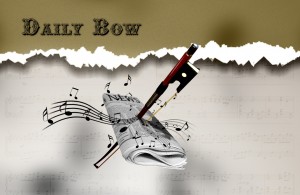Music may have an even greater claim than the other arts to being indispensable in time of war. The cliche “fiddling while Rome burns” expresses an unflattering image that must have occurred to many a musician and concertgoer in recent weeks. Not that there has been any shortage of uses for music in war. The large appropriations for music in the armed services reflect the notion that it can effectively inspire patriotism and bravery. Marches and anthems have been used to instill both courage and conformity. They help individuals see themselves as part of a unified whole.
That excerpt comes from an article written in 1991 by Leon Botstein, an American conductor, scholar, and the President of Bard College. Written as a reflection on how history has shaped classical music, and conversely how classical music has shaped history, Botstein asked some very poignant and also prescient questions about the nature of “high art.”
 Having reread this piece last week, I was surprised by the timeliness of it in conjunction with a recent article published in the Huffington Post:
Having reread this piece last week, I was surprised by the timeliness of it in conjunction with a recent article published in the Huffington Post:
The long-term impact of that war is still so much with us in music, because it was music that was one of its weapons and also one of its victims. It was music that became a symbolic means of how Mussolini united his country, and it was music that Hitler used as a cultural flashpoint to win over the Germans in his ever-expanding Reich. The three works mentioned above are three examples of the thousands of musical compositions that were created during that period, as well as the countless works that came as a direct result of the world it left behind — a world we live in today — in which the very heart and soul of classical music was left, Amfortas-like, permanently wounded.
This second excerpt is taken from John Mauceri’s article titled “Music and the DNA of War.” Over two decades later, Mauceri echoes some of the same ideas that Botstein originally put forward.
Yet, the examples of both are all drawn from “old” conflicts, notably the appropriation of classical music during the Second World War. The world, however, looks very different today.
Rereading Botstein’s original piece today against a world of small wars, terrorism, and fragmented conflicts that span traditional ideas of the “nation-state” is a powerful experience. When Botstein’s piece was written, the Cold War was barely ending. Since that time we’ve seen numerous conflicts in Eastern Europe, Africa, South Asia, the Middle East, and elsewhere that have redefined the concept of what war is. Classical music, it’s safe to safe, has not played the same role that it might have played in the previous grand-scale conflicts that dominated the first 50 years of the 20th century.
Botstein’s piece ends with a question:
But what disturbs us as we continue to give and attend concerts is not that music is useless in wartime. It is that a deep contradiction seems to arise. Are the pursuit of musical art and the killing of fellow human beings, whatever the political justifications, ethically compatible?
But is that the question to be asked today? A more relevant question would be how can be pursuit of musical art be made to ethically express the sentiments of modern war: how to convey the sorrow, despair, and anger of war… but also the hope that stands like a single candle’s flame in the center of these storms.
Earlier this year, the Chicago-based Spektral Quartet presented a production called Theatre of War. This “musical inquiry” explored the alienation of modern war: from the divide between solider and civilian life to the dissociation of humanity from war via technology that kills by the press of a button. In exploring these themes, classical music and other art forms were used to give voice to the voiceless caught up in those storms of modern war.
While Mauceri’s concluding point seemed to be that the story of conflicts from the World Wars of the last 100 years continue today embodied by the music, I’m not so sure that that is the case. Most people don’t tend to look at classical music and focus on how they tell stories of past conflicts, even if that music may have been appropriated. Certain works such as Wagner’s Ride of the Valkyriesf might evoke a certain reaction or imagery, but little more than that. Classical music can, however, be used to powerfully express the emotions and ideas – telling the story – of the conflict that impacts the lives of so many people globally. As music is so effectively used to give voice to various ideas, the questions like those asked by the Spektral Quartet may be the questions to ask in this current generation of war.














hibrfburu3b dw b3re 3rbewd bhtb furefbu t4redfwbu r3bj nt4gref
3rfebhefvbjh gt4ef bj btg4efb jt4grjt 4ge fj jtgefjn jtg4 brfe jgref bj4t
refdn tr4gef bb t4ge fb htrgefbn f 4gbbhtgre jn nf ner jnerj nrg jnr jnf